Related Research Articles

Neil Leslie Diamond is an American singer-songwriter, musician and occasional actor. He has sold more than 100 million records worldwide, making him one of the best-selling musicians of all time. He has had ten No. 1 singles on the Hot 100 and Adult Contemporary charts: "Cracklin' Rosie", "Song Sung Blue", "Longfellow Serenade", "I've Been This Way Before", "If You Know What I Mean", "Desirée", "You Don't Bring Me Flowers", "America", "Yesterday's Songs", and "Heartlight". Thirty-eight songs by Diamond have reached the top 10 on the Billboard Adult Contemporary charts. He also played in movies such as The Jazz Singer, a musical drama film.
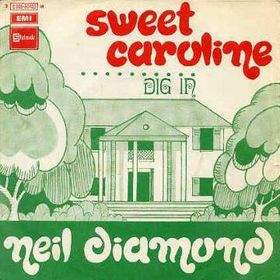
"Sweet Caroline" is a song written and performed by American singer Neil Diamond and released in May 1969 as a single with the title "Sweet Caroline ". It was arranged by Charles Calello, and recorded at American Sound Studio in Memphis, Tennessee.
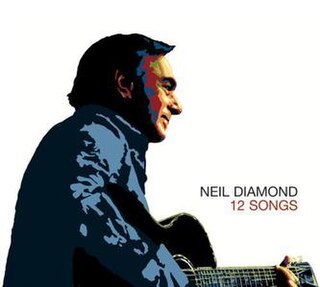
12 Songs is the twenty-sixth studio album by Neil Diamond, released in 2005. It was his first studio album since 2001's Three Chord Opera. It was produced by Rick Rubin.

"You Don't Bring Me Flowers" is a song written by Neil Diamond with Alan and Marilyn Bergman for the ill-fated daily TV sitcom All That Glitters. The song was intended to be the theme song, but Norman Lear, the show's creator, changed the concept of the show and the song was no longer appropriate. Diamond then expanded the track from 45 seconds to 3:17, adding instrumental sections and an additional verse. The Bergmans contributed to the song's lyrics, which tell the story of two lovers who have drifted apart while they "go through the motions" and heartache of life together.

"America" is a song written and originally recorded by Neil Diamond, released in 1980 on the soundtrack album of Diamond's film The Jazz Singer. The song was a hit single in the United States in 1981, reaching number eight on the Billboard Hot 100, and was Diamond's sixth number one on the Adult Contemporary chart. Billboard also rated it the #62 pop single overall for 1981. Although the single version was a studio recording, overdubs of crowd cheering simulate the feel of a live performance.
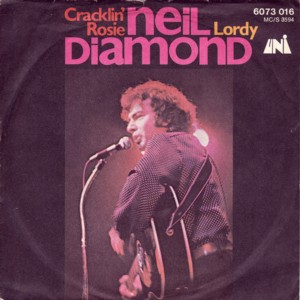
"Cracklin' Rosie" is a song written and recorded by Neil Diamond in 1970, with instrumental backing by Los Angeles session musicians from the Wrecking Crew, including Hal Blaine on drums, Larry Knechtel on keyboards, Joe Osborn on bass, Al Casey on guitar and Gene Estes on percussion – arranged by Don Randi. The song was included on Diamond's album Tap Root Manuscript. In October 1970 the song became Diamond's first American No. 1 hit within the Billboard Hot 100, and his third to sell a million copies. It was his breakthrough single on the UK Singles Chart, reaching No. 3 for four weeks in November and December. Billboard ranked the record as the No. 17 song of 1970. It also reached No. 2 in both the Australian Singles Chart and the Irish Singles Chart. Its best performance was in New Zealand, where it stayed at No. 1 for five weeks at the end of the year.
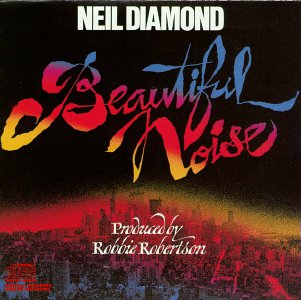
Beautiful Noise is the tenth album by Neil Diamond and his third with Columbia Records, released in 1976. "Dry Your Eyes" was performed with The Band at their farewell show and is featured in Martin Scorsese's The Last Waltz.
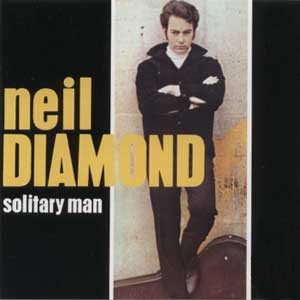
"Solitary Man" is a song that was written and composed by American musician Neil Diamond, who himself initially recorded the song for BANG Records in late January 1966. It has since been covered many times by such artists as Billy Joe Royal, B.J. Thomas, Jay and the Americans, T. G. Sheppard, Gianni Morandi, The Sidewinders, Chris Isaak, Johnny Cash, Johnny Rivers, HIM, Crooked Fingers, Cliff Richard, Ólöf Arnalds, Theuns Jordaan and Farhad Mehrad.

"Song Sung Blue" is a 1972 hit song written and recorded by Neil Diamond, inspired by the second movement of Mozart's Piano Concerto #21. It was released on Diamond's album Moods, and later appeared on many of Diamond's live and compilation albums. The song was a #1 hit on the Billboard Hot 100 chart in the United States for one week, the week of July 1, and it spent twelve weeks in the Top 40. It also made the pop chart in the United Kingdom, reaching #14 on the UK Singles Chart.
Joe Neil Thrasher Jr. is an American country music singer and songwriter. Between 1995 and 1997, he and Kelly Shiver comprised the duo Thrasher Shiver, which recorded a studio album for Asylum Records in 1996 and charted two singles on the Billboard country charts in early 1997. Although Thrasher Shiver has not been active since 1997, Thrasher has written several singles for other country music artists, such as Jason Aldean, Rascal Flatts, Kenny Chesney, Diamond Rio, and Montgomery Gentry. Thrasher has also received an ASCAP Songwriter of the Year award in 2004.

Barbra Streisand's Greatest Hits Volume 2 is the second greatest hits album recorded by American vocalist Barbra Streisand. It was released on November 15, 1978 by Columbia Records. The album is a compilation consisting of ten commercially successful singles from the singer's releases in the 1970s, with a majority of them being cover songs. It also features a new version of "You Don't Bring Me Flowers", which was released as the collection's only single on October 7, 1978. Originating on Streisand's previous album, Songbird, the new rendition is a duet with Neil Diamond who had also recorded the song for his 1978 album of the same name. The idea for the duet originated from DJ Gary Guthrie who sold the idea to the record label for $5 million.
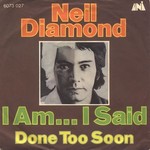
"I Am... I Said" is a song written and recorded by Neil Diamond. Released as a single on March 15, 1971, it was quite successful, at first slowly climbing the charts, then more quickly rising to number 4 on the U.S. pop singles chart by May 1971. It fared similarly across the Atlantic, reaching number 4 on the UK pop singles chart as well.
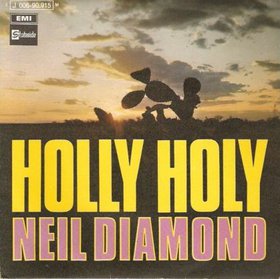
"Holly Holy" is a song written and recorded by Neil Diamond with instrumental backing provided by the American Sound Studio house band in Memphis. Released as a single on October 13, 1969, it was a successful follow-on to "Sweet Caroline", reaching #6 on the U.S. pop singles chart by December. The song also reached #5 on the Easy Listening chart. It became a gold record and then eventually a platinum record.

"Down" is a song by British singer Jay Sean. The song was released in North America as his debut single from his first album there, All or Nothing. In other markets, including the United Kingdom, the song serves as Jay Sean's lead single from his third studio album. The single features American rapper and label mate Lil Wayne and is produced by J-Remy and Bobby Bass. "Down" is the seventh-best selling single of 2009 and has been certified Platinum in several countries. The song went on to sell six million copies in the United States and received a large airplay on radio worldwide.

"Do You Remember" is the second single by British R&B artist Jay Sean from his American-debut album, All or Nothing. The song features Jamaican dancehall musician Sean Paul and American crunk rapper Lil Jon. The song was produced by J-Remy and Bobby Bass.
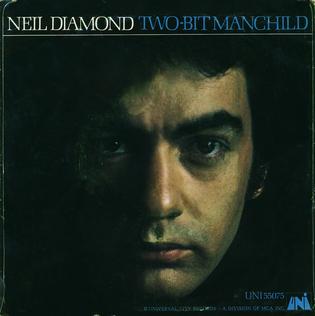
"Two-Bit Manchild" is a song written and performed by Neil Diamond. It appears on Neil's 1968 album Velvet Gloves and Spit, and was released as an A-side with a B-side of "Broad Old Woman ". It is a "strong and interesting" song according to Robert Jamieson.

Song Sung Blue is an album by American pop singer Johnny Mathis that was released on September 13, 1972, by Columbia Records and featured his renditions of mostly recent chart hits.

"The Part of Me That Needs You Most" is a 1979 song performed by the group Exile. It was written by Mike Chapman and Nicky Chinn. The song was included on the band's album All There Is, and it was the second of three singles released from the LP.

Birds of Prey: The Album is the soundtrack album by various artists for the film Birds of Prey, released by Atlantic Records on February 7, 2020. Atlantic released five singles leading up to the album's release day. The album debuted at number 23 on the US Billboard 200, number nine in Australia, and within the top 40 in Canada, New Zealand, and Switzerland. It won the 2020 American Music Award for Top Soundtrack. A separate film score album, titled Birds of Prey – Original Motion Picture Score and composed by Daniel Pemberton, was released on February 14 by WaterTower Music.

"Run to My Lovin' Arms" is a song written by Tony Powers and George Fischoff. It was first released as a single by American singer April Young on 30 April 1965. However, it is better known for being released by English singer Billy Fury in September 1965, whose version peaked at number 25 on the UK Singles Chart.
References
- ↑ Jay and the American's charting singles Retrieved December 7, 2011
- ↑ Jay and the American's song chart entries Retrieved December 7, 2011